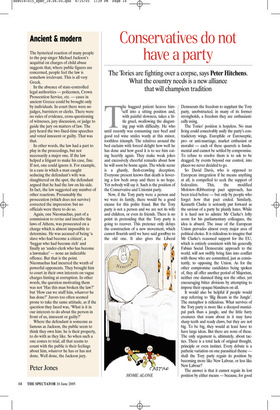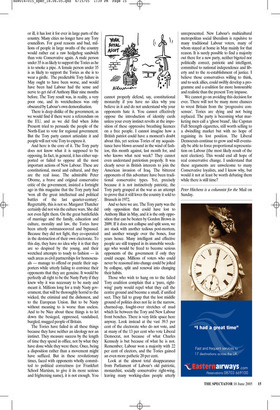Conservatives do not have a party
The Tories are fighting over a corpse, says Peter Hitchens. What the country needs is a new alliance that will champion tradition The haggard patient heaves himself into a sitting position and, with painful slowness, takes a little gruel, swallowing the disgusting pap with difficulty. He who until recently was consuming rare beef and good red wine smiles wanly at this minor, toothless triumph. The relatives around the bed exclaim with forced delight how well he has done and how good it is to see him eating heartily again. They make weak jokes and excessively cheerful remarks about how he will soon be home again. The whole scene is a ghastly, flesh-crawling deception. Everyone present knows that death is hovering a few beds away and there is no hope. Yet nobody will say it. Such is the position of the Conservative and Unionist party.
Now, if the Tory party were a person and we were its family, there would be a good excuse for this polite fraud. But the Tory party is not a person and we are not its wife and children, or even its friends. There is no point in pretending that the Tory party is going to recover. This pretence only delays the construction of a new movement, which cannot flourish until we have said goodbye to the old one. It also gives the Liberal Democrats the freedom to supplant the Tory party, unobstructed, in many of its former strongholds, a freedom they are enthusiastically using.
The Tories’ position is hopeless. No man living could conceivably unify the party’s contradictory wings. Europhile or Eurosceptic, proor anti-marriage, market enthusiast or moralist — each of these quarrels is fundamental and cannot be settled by compromise. To refuse to resolve them is to ask to be dragged, by events beyond our control, into places we never decided to go.
So David Davis, who is opposed to European integration if he means anything at all, is compelled to seek the support of federalists. This, the modified Molotov–Ribbentrop pact approach, has been tried before — but only by people who forget how that pact ended. Similarly, Kenneth Clarke is seriously put forward as the saviour of a party he plainly hates. While it is hard not to admire Mr Clarke’s lofty scorn for his parliamentary colleagues, the idea is absurd. The issue of the European Union pervades almost every major area of political choice. It is ridiculous to imagine that Mr Clarke’s reasoned support for the EU, which is entirely consistent with his generally Fabian Social Democratic approach to the world, will not swiftly bring him into conflict with those who are committed, just as consistently, to opposing the Union. As for the other compromise candidates being spoken of, they all offer another period of Majorism, neither one damned thing nor the other, yet encouraging bitter divisions by attempting to impose their opaque blandness on all.
It would also be helpful if people would stop referring to ‘Big Beasts in the Jungle’. The metaphor is ridiculous. What survives of the Tory party is more like a decayed municipal park than a jungle, and the little furry creatures that roam about in it may have sharp teeth and ready claws, but they are not big. To be big, they would at least have to have large ideas. But there are none of these. The only argument is, ultimately, about tactics. There is a total lack of original thought, principle or even instinct. Every debate is a pathetic variation on one parasitical theme shall the Tory party regain its position by becoming more like New Labour, or less like New Labour?
The answer is that it cannot regain its lost position by either means — because, for good or ill, it has lost it for ever in large parts of the country. Many cities no longer have any Tory councillors. For good reasons and bad, millions of people in large swaths of the country would rather eat a raw hedgehog sandwich than vote Conservative again. A male person under 35 is as likely to support the Tories as he is to smoke a pipe. A female person under 35 is as likely to support the Tories as she is to wear a girdle. The predictable Tory failure in May ought to have been worse, and would have been had Labour had the sense and nerve to get rid of Anthony Blair nine months before. The Tory result was, in reality, a very poor one, and its wretchedness was only obscured by Labour’s own demoralisation.
There is deep dislike of the government, as we would find if there were a referendum on the EU, and as we did find when John Prescott tried to persuade the people of the North-East to vote for regional government. But the Tory party cannot articulate it and people will not vote Tory to express it.
And here is the core of it. The Tory party does not know what it is supposed to be opposing. In fact, in general, it has either supported or failed to oppose all the most important actions of New Labour. These are constitutional, moral and cultural, and they are the real issue. The admirable Peter Oborne, a brave and original conservative critic of the government, insisted a fortnight ago in this magazine that the Tory party had ‘won all the great intellectual and political battles of the last quarter-century’. Regrettably, this is not so. Margaret Thatcher certainly did not win the culture wars. She did not even fight them. On the great battlefields of marriage and the family, education and culture, morality and law, the Tories have been utterly outmanoeuvred and bypassed. Because they did not fight, they co-operated in the destruction of their own electorate. To this day, they have no idea why it is that they are so despised by the young, and their wretched attempts to toady to fashion — in such areas as civil partnerships for homosexuals — manage to offend or puzzle their supporters while utterly failing to convince their opponents that they are genuine. It would be perfectly all right to be the Nasty Party if they knew why it was necessary to be nasty and meant it. Millions long for a truly Nasty government, that will be thoroughly horrid to the wicked, the criminal and the dishonest, and to the European Union. But to be Nasty without meaning to is worse than useless. And to be Nice about these things is to let down the besieged, oppressed, vandalised, burgled, mugged people of Britain.
The Tories have failed in all these things because they have neither an ideology nor an instinct. They measure success by the length of time they spend in office, not by what they have done while they were there. Once, being a disposition rather than a movement might have sufficed. But in these revolutionary times, faced with opponents wholly committed to political correctness (or Frankfurt School Marxism, to give it its more serious and frightening name), it is not enough. You cannot properly defend, say, constitutional monarchy if you have no idea why you believe in it and do not understand why your opponents hate it. You cannot effectively oppose the introduction of identity cards unless your every instinct revolts at the imposition of these oppressive breathing licences on a free people. I cannot imagine how a British patriot could have a moment’s doubt about this, yet serious Tories of my acquaintance have blown around in the wind of fashion, this month against, last month for, and who knows what next week? They cannot even understand patriotism properly. It was clearly never in British interests to join the American invasion of Iraq. The bitterest opponents of this adventure have been traditional conservative types. Yet, precisely because it is not instinctively patriotic, the Tory party grasped at the war as an attempt to prove that it still loves the country it sold to Brussels in 1972.
And so here we are. The Tory party was the only opposition that could have lost to Anthony Blair in May, and it is the only opposition that can be beaten by Gordon Brown in 2009. If it does not collapse and split soon, we are stuck with another tedious post-mortem, and another wrangle over the bones, four years hence. Many intelligent and effective people are still trapped in its immobile wreckage who would be freed to become serious opponents of the government if only they could escape. Millions of voters who could never be reasoned into change could be jolted by collapse, split and renewal into changing their habits.
Those who wish to hang on to the failed Tory coalition complain that a ‘pure, rightwing’ party would repel what they call the centre ground and become a small, if unified sect. They fail to grasp that the lost middle ground of politics does not lie in the narrow, churned-up, fought-over stretches of mud which lie between the Tory and New Labour front benches. There is very little space here anyway. Look instead at the vast 39.5 per cent of the electorate who do not vote, and at many of the 13 per cent who vote Liberal Democrat, not because of what Charles Kennedy is but because of what he is not. Remember, Labour won a majority with 22 per cent of electors, and the Tories gained an even more pathetic 20 per cent.
Look at the almost total disappearance from Parliament of Labour’s old patriotic, monarchist, socially conservative right-wing, leaving many working-class people utterly unrepresented. New Labour’s multicultural metropolitan social liberalism is repulsive to many traditional Labour voters, many of whom stayed at home in May mainly for that reason. It is surely possible to find a majority out there for a new party, neither bigoted nor politically correct, patriotic and intelligent, committed to national independence and liberty and to the re-establishment of justice. I believe those conservatives willing to think, and to seek allies, could swiftly develop a programme and a coalition far more honourable and realistic than the present Tory impasse.
We cannot go on avoiding this decision for ever. There will not be many more chances to wrest Britain from the ‘progressive consensus’. Tories are dying and not being replaced. The party is becoming what marketing men call a ‘ghost brand’, like Capstan Full Strength cigarettes, still worth selling to a dwindling market but with no hope of regaining its lost position. The Liberal Democrats continue to grow and will eventually be able to force proportional representation on Labour (the most likely result of the next election). This would end all hope of real conservative change. I understand that these arguments are unwelcome to many Conservative loyalists, and I know why, but would it not at least be worth debating them while there is still time?

















































 Previous page
Previous page